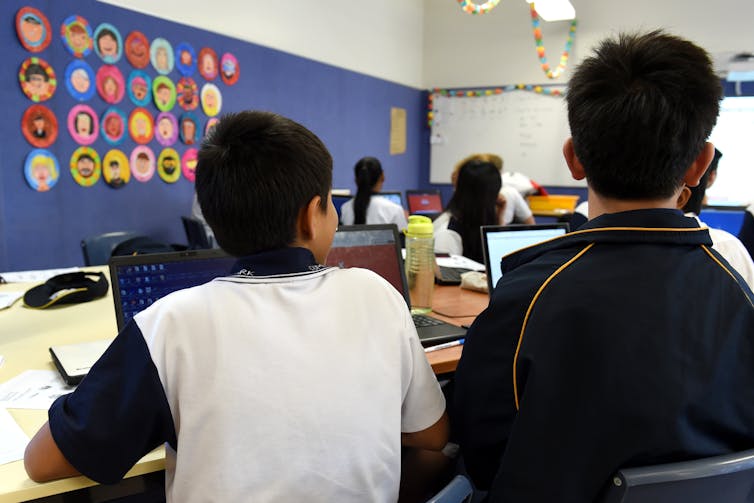why reducing the number of subjects isn't the answer
- Written by Don Carter, Senior Lecturer, Education, University of Technology Sydney
Recently, the NSW government announced a review of the state’s curriculum, describing it as “a once in a generation chance to examine, declutter and improve the NSW curriculum to make it simpler to understand and to teach”. The review will take place over the next 18 months.
This review is significant because it might result in significant changes to what students study in school. But it needs to focus on the primary school curriculum. It should also take into account the Melbourne Declaration on Educational Goals for Young Australians, and strategically investigate the range of NSW syllabuses and outcomes. These indicate the knowledge, understanding and skills most students are expected to gain by the end of a stage of learning.
Simplistic approaches to this issue may advocate reducing the number of subjects in the primary curriculum. But this would be a backward step and potentially deny students a range of learning experiences.
Why the review needs to focus on the primary curriculum
The review needs to focus on the primary school curriculum for three reasons:
many have long claimed primary schools are being asked to implement what is called a “crowded curriculum”
in NSW, 20 new senior school syllabuses have already been released for implementation this year. And given the promotion of the Higher School Certificate (HSC) by successive governments as the “gold standard”, it’s hard to imagine significant changes to the structure of this award
five new kindergarten to year ten syllabuses have been implemented in NSW schools over the past four years, so the withdrawal of these documents would cause considerable disruption to schools.
 Each child deserves a childhood that nurtures learning across a well-balanced curriculum.
Jenny Evans/AAP
Each child deserves a childhood that nurtures learning across a well-balanced curriculum.
Jenny Evans/AAP
What can be done about a crowded curriculum?
So far, the debate about decluttering the curriculum has focused on deleting subjects. One recommendation was for children to initially study English and mathematics and delay the study of science, history and geography until year four.
While no-one disputes the importance of developing students’ literacy and numeracy skills, this suggestion would be a retrograde step, potentially denying children learning experiences in and exposure to the knowledge, ideas and skills particular to these other learning areas.
One critical aspect is that NSW is a signatory to the Melbourne Declaration on Educational Goals for Young Australians. It provides the philosophical basis for curriculum development in Australia. It aims to develop students as successful learners, confident and creative individuals and active and informed citizens.
Read more: Gonski 2.0: teaching creativity and critical thinking through the curriculum is already happening
This is important because a reduction in the breadth of primary curriculum might be at odds with NSW’s commitment to this agreement. In any case, the NSW curriculum authority states “syllabuses have been developed with respect to some overarching views about education” based on key documents such as the Melbourne Declaration.
So what can be done? One answer lies in revisiting the aims of the 2003 Eltis Report. This report, in part, examined the number and role of syllabus outcomes. But this time we need to consider outcomes in the context of the existing mix of new K-10 syllabuses and old (2004) syllabuses.
 Removing subjects from the curriculum would be a step backwards.
Paul Miller/AAP
Removing subjects from the curriculum would be a step backwards.
Paul Miller/AAP
Currently across the subjects of English; mathematics; science; personal development, health and physical education (PDHPE); creative and performing arts; history; and geography, there are approximately 300 outcomes teachers must integrate into their teaching. Assessment of student performance is based on these outcomes. This is reaching the same exorbitant number of outcomes that sparked the Eltis Report over a decade ago.
Such a review will identify, for example, English, where teachers are advised to spend 25-35% of weekly teaching hours teaching the subject, has 45 outcomes across kindergarten to year six. Yet in the current PDHPE syllabus, where the recommendation is 6-10% of teaching hours per week, the current syllabus contains 52 outcomes. A rationalisation of the volume of outcomes according to recommended teaching hours needs to happen.
Read more: What will changes to the national curriculum mean for schools? Experts respond
Another step is to change the requirement all outcomes in a subject are to be assessed. Instead, provide teachers with the opportunity to teach all outcomes in a subject but only assess two to three designated key outcomes.
This will provide a more targeted approach to assessment while allowing for the teaching of an appropriate scope of content. As with the Eltis Report, priority might be given to literacy and numeracy outcomes to allow for deep and meaningful engagement by students.
Don’t oversimplify the task
“Decluttering” the curriculum is not a simple case of reducing the number of subjects. We need to closely examine the current suite of syllabuses and identify where overlap, duplication and redundancy in outcomes exist and eliminate these aberrations.
We also need to remember primary-aged children are not mini-adults in a pre-employment phase of life. Each child deserves a childhood that nurtures learning across a well-balanced program of learning, fosters the development of imagination and creativity, and provides the skills and knowledge that enables the development of high order literacy and numeracy skills. And importantly, each child deserves to enjoy their school education.
Authors: Don Carter, Senior Lecturer, Education, University of Technology Sydney



















